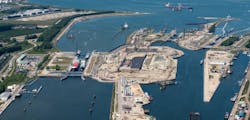Technip handling front-end engineering for ExxonMobil Hydrogen project in Texas
Energy firm ExxonMobil has awarded a contract to Technip Energies for the front-end engineering and design (FEED) of what the oil giant calls the world’s largest low-carbon hydrogen production facility in Baytown, Texas.
The facility is expected to start operations in 2027-2028 and produce 1 billion cubic feet hydrogen gas per day. It is projected to capture and permanently store over 98-percent of associated CO2 emissions, totaling approximately 7 million metric tons annually.
Additionally, the carbon capture and storage system being constructed for the project will be accessible to third-party CO2 emitters in the area to aid in their decarbonisation, ExxonMobil says.
The company expects the project to reduce up to 30-percent of Scope 1 and 2 emissions from its Baytown complex by using low-carbon hydrogen instead of natural gas. Hydrogen does not contain a carbon molecule and does not emit CO2 when combusted, but it can only be generated by electrolysis or steam reforming of methane gas.
“This project allows us to offer significant volumes of low-carbon hydrogen and ammonia to third party customers in support of their decarbonization efforts,” said Dan Ammann, President of ExxonMobil Low Carbon Solutions. (Read more of this story after related links)
Read more of EnergyTech's coverage on Hydrogen in the C&I Energy Transition
Hexagon Purus banks on Fuel Cell Transport future with H2 Cylinder factory in Maryland
Babcock & Wilcox joining Fidelis on H2 production project
ExxonMobil notes that it will integrate the low-carbon hydrogen facility with the largest olefins plant in the U.S. to produce more sustainable, low-emission products. Olefins are chemicals, made up of hydrogen and carbon, used in production of plastic resins, detergents and adhesives, among other manufactured products.
The energy firm plans to make a final investment decision on the project by 2024, subject to stakeholder approval, regulatory permitting, and market conditions.
ExxonMobil is a multinational oil and gas company headquartered in Irving, Texas. It aims to achieve net-zero Scope 1 and 2 greenhouse gas emissions from its operated assets by 2050.
Technip Energies is a French engineering and technology company for the energy industry and chemicals sector.





